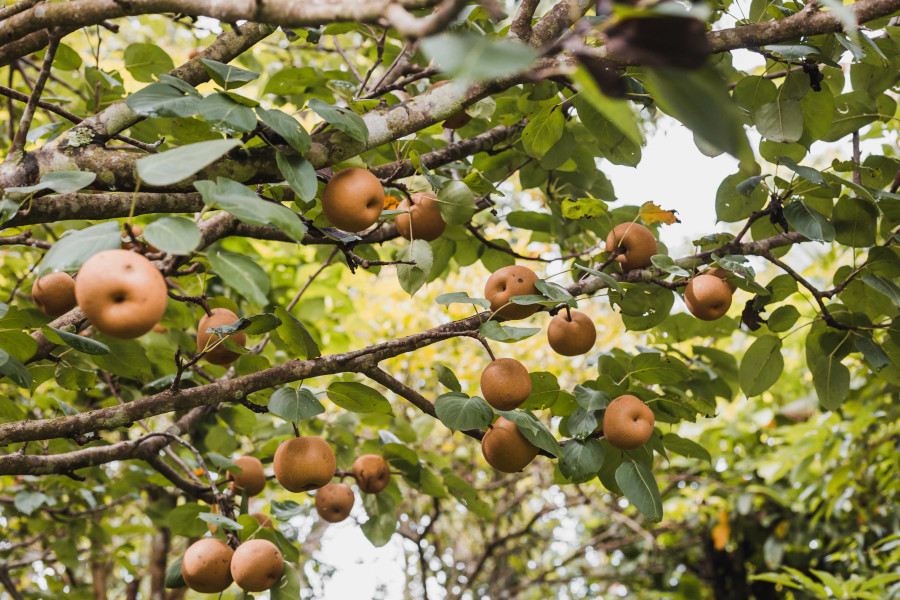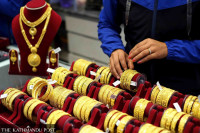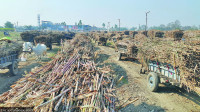Money
Cold store proves a boon to fruit farmers in Dhankuta
The refrigerated warehouse has allowed growers to keep their harvest for months and sell it at a fair price.
Pradeep Menyangbo
Fruit growers Mali and Sambhu Magar of Namje village in Dhankuta saw their earnings quadruple after a cold store was built in the nearby town of Dharan, which allowed them to keep their harvest until they got a good price for it.
The brothers from the eastern hill district never knew that their fruits could be kept for months, and that they didn't have to rush to sell them to middlemen at throwaway prices or leave them to rot in the fields.
This autumn, they earned four times as much as they used to from their pear crop, thanks to the refrigerated warehouse set up by the Agricultural Commodity Market Management Committee in Dharan.
During the pear picking season in August, there is a plentiful supply of the fruit in the market, and its price drops to Rs15-20 per kg. The Magar brothers kept their harvest in cold storage, aiming to sell it during festivals like Dashain, Tihar and Chhath, when demand for fruits rises steeply.
They were correct, and they are now selling the fruits for Rs70-80 per kg wholesale. The retail price has crossed Rs100 per kg.
The pears produced in Namje village of Sangurigadhi Rural Municipality were kept in cold storage for the first time which proved a tremendous benefit to local farmers.
During the off season, Nepali consumers are forced to pay four to five times more than the usual price for scarce vegetables and fruits that are normally imported.
Due to lack of proper storage facilities, fruit and vegetable farmers across the country regularly face troubles as they don’t get a fair price and their unsold produce eventually spoil.
In the past two years, farmers incurred heavy losses as Covid-19 triggered lockdowns on two occasions, leading to transportation restrictions and disruptions to the supply chain. They had to watch helplessly as their fruits and vegetables rotted in the fields.
Every year, farmers have to endure many problems due to lack of basic facilities. Prices fall sharply during this particular season.
The government has incorporated provisions in the recently announced budget allowing the local level and provinces to inject funds in the development and commissioning of infrastructures like cold storage to manage farm products.
Parshuram Katwal, chairman of the committee, said that pears kept in the cold store were sold in the market on Ghatasthapana, the first day of Dashain.
“The pear season ended two months ago in mid-August. But keeping the fruits in storage and selling them during the festival season has benefitted the farmers tremendously in terms of price.”
Many farmers are likely to follow the example and put their harvest in cold storage.
According to him, 1,000 kg of pears were put in the cold store as a pilot project. The charge for use of the refrigerated warehouse is Rs20 per kg for two and a half months.
Demand for fruits grows significantly during the festival time.
Laxman Bhattarai, market manager of the committee, said the piloting was successful as they had no prior knowledge about storing fruits and vegetables. The fruits are stored at 4 to 6 degrees Celsius.
Domestic pears fetch higher prices as compared to apples.
During this year's harvest season that lasted until August-end, farmers in Dhankuta district sold 3,571 tonnes of pears worth Rs70 million. Only a few farmers kept the produce in the cold storage plant.
According to Bhattarai, the successful piloting of the storage facility may attract more farmers.
Nepal's eastern hill districts—Taplejung, Dhankuta, Tehrathum, Sankhuwasabha and Khotang—produce a large quantity of pears annually; but the growers do not get a fair return for their labour as there is a supply glut in the market during the harvest season and prices plunge.
These districts produce organic pears which are larger in size, juicy and sweet, but the government provides no assistance in branding, labelling, marketing and packaging, farmers say.
The fruit is a rich dietary source of minerals and vitamins. According to agriculture experts, pears contain sufficient iron that the human body needs. High-fibre pears, which also contain antioxidants, are rich in iron, vitamins A, B1 and V2, calcium, sulfur, phosphorus, sodium, magnesium, potassium and copper.
Nepal produces more than 5,800 tonnes of pears on 934 hectares of land, according to the statistics of the Ministry of Agriculture and Livestock Development.




 9.21°C Kathmandu
9.21°C Kathmandu













